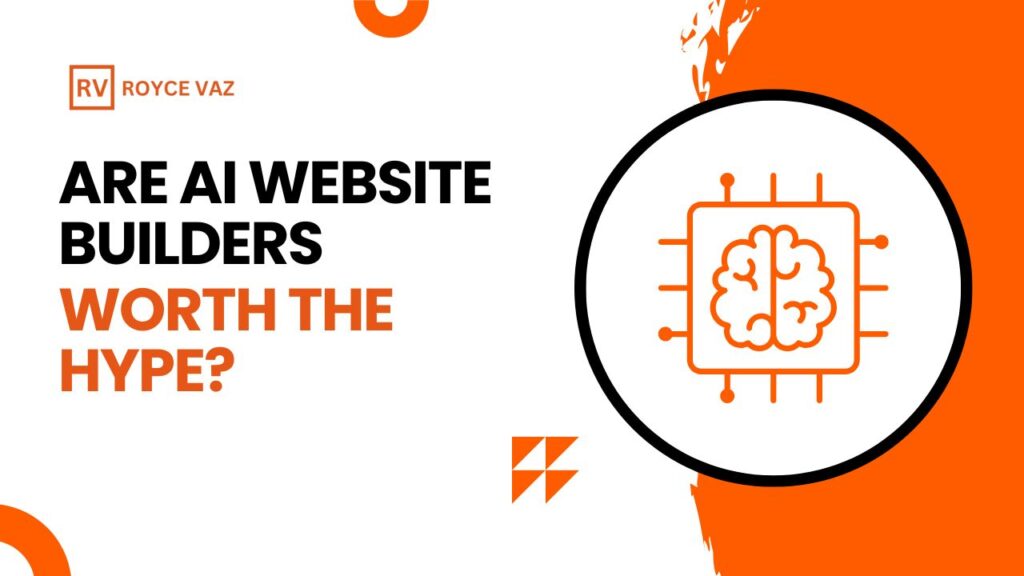Artificial Intelligence (AI) is transforming how we build websites. With promises of instant site generation, automated design, and minimal technical knowledge required, AI website builders are gaining significant traction. But the question remains — are they really worth the hype?
In this article, we’ll explore what AI website builders offer, their pros and cons, and whether they’re a good choice for your next website project.

What Are AI Website Builders?
AI website builders use artificial intelligence and machine learning algorithms to automate the process of building a website. Instead of manually selecting templates, adding sections, or tweaking layouts, these platforms ask a few questions and then generate a personalized website — often within minutes.
Popular AI website builders include:
- Wix ADI
- Zyro
- Bookmark
- Durable
- 10Web AI Builder
How Do AI Website Builders Work?
Most AI website builders follow a simple process:
- Ask a series of questions (e.g., type of business, goals, design preferences).
- Use AI to create the structure, design, and content.
- Provide tools to customize the generated site further.
This means you can get a functional, attractive website without needing to code or design it yourself.
Pros of AI Website Builders
1. Speed and Convenience
AI can generate a complete website in under 10 minutes. This is perfect for solopreneurs or small businesses who need something quick.
2. No Technical Skills Needed
You don’t need to know HTML, CSS, or design principles. AI handles layout, colors, fonts, and even basic content.
3. Cost-Effective
Most AI website builders are cheaper than hiring a developer or agency. Plans often start at a few dollars per month.
4. Smart Design Suggestions
Some platforms offer data-driven suggestions to improve your website based on industry standards or user behavior.
5. Built-in Optimization
AI tools often come with built-in SEO, responsive design, and performance optimizations by default.
Cons of AI Website Builders
1. Limited Customization
While AI builders offer templates and personalization, there are still limits. If you need a highly customized feature, you may hit a wall.
2. Generic Designs
AI-generated websites can feel templated or similar to others using the same platform. Branding may suffer if you don’t customize deeply.
3. Content Quality
Some AI builders generate copy, but it may lack depth, personality, or accuracy. Manual editing is often needed.
4. Scalability Issues
For growing businesses or complex websites, AI builders might not support advanced integrations, eCommerce features, or backend customization.
5. Locked Into a Platform
AI builders often come as part of a proprietary platform. You may not be able to move your website elsewhere easily.
Who Should Use AI Website Builders?
AI builders are best suited for:
- Freelancers or solopreneurs
- Local businesses
- Landing pages or portfolio sites
- Beginners launching their first site
- Temporary campaigns or MVPs (minimum viable products)
They may not be ideal for:
- Large-scale businesses
- Feature-heavy web apps
- Niche sites with unique functionality
Are They Worth the Hype?
Yes — for the right user.
If your goal is to get online fast with minimal fuss, AI website builders offer incredible value. They’re not a replacement for fully custom development but serve as a powerful tool for quick deployment and experimentation.
For bloggers, consultants, or local businesses, AI builders are definitely worth trying.
However, if your business relies heavily on SEO, custom features, or a unique user experience, you may eventually outgrow what AI builders can offer.
Final Verdict
AI website builders are not just a trend — they represent a shift in how websites are being created. They’re not perfect, but for certain users, they eliminate the barrier to entry, save time, and reduce costs.
So, are they worth the hype?
Yes — if you understand their limits and use them strategically.
If you’re testing an idea, launching fast, or just need a clean, functional site — AI website builders are absolutely worth exploring.

